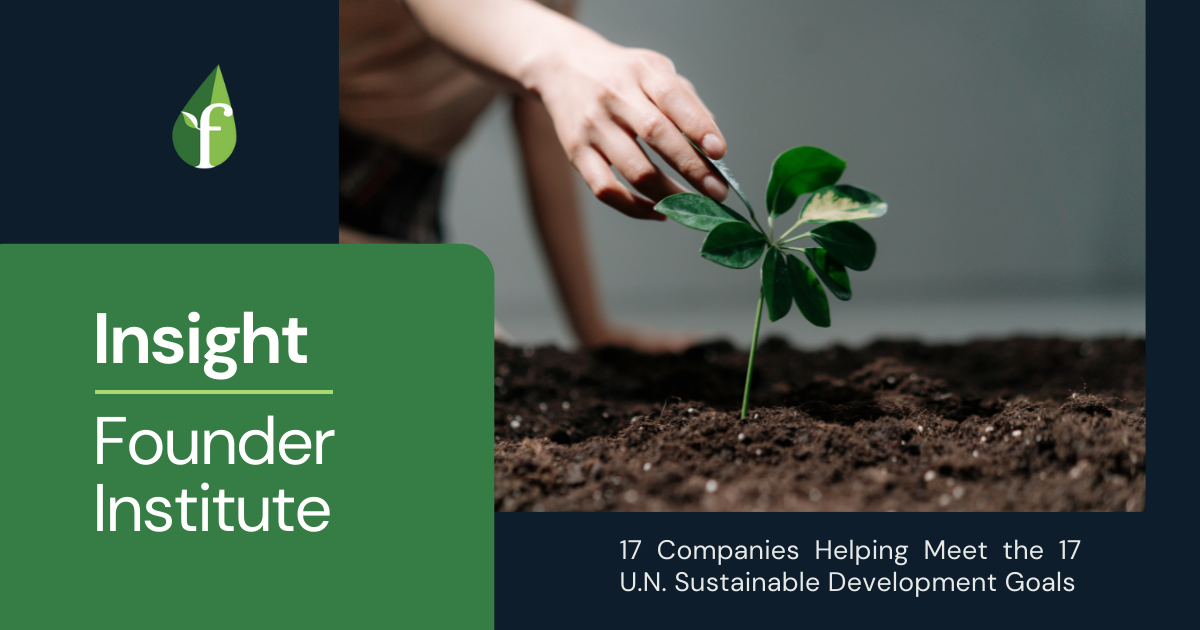
Recently Catherine Griffin, Founder of ImpactableX Analytics and Managing Director of GoodCompany Ventures, joined the Founder Institute for a live online event on the topic of ‘Quantifying Social and Environmental Impact for Investors.’
Griffin presented briefly on Social Impact Theory by way of introduction, and then dove straight into the nitty-gritty details, providing a methodological framework that founders can use to generate Social Impact Projections, as well as a Revenue Multiple and Capital Multiple for any impact startup. Griffin explained ImpactableX Analytics’ own definition for "What is social impact" by way of the following outline:
- Entrepreneurs solve massive problems.
- Solving big problems creates massive value.
- Entrepreneurs figure out how to create and capture value.
- Revenue reflects the portion of that value that can be monetized.
- Social Impact = Unmonetized External Value
With respect to the unique challenges posed by COVID-19 and the opportunities at hand for improving social and environmental outcomes, Griffin was optimistic about this particular moment for impact founders, as well as the future ahead, saying,
The world needs social innovation now more than ever. We’re crossing paths at a really unique time, when decision-makers at all levels—investors, municipalities, consumers, homeowners—folks are unusually open, questioning how to move forward from this crisis; how to address the structural inequities that have been exposed; how to keep themselves and their families safe; who to believe; and what the future will look like. As changemakers you have the unique opportunity to leverage this crisis, to capitalize on this collective pause and to touch people with new ideas.
In her presentation, Griffin notes that the global market for Impact Investing is now up to $715B so far in 2020, from just $502B in 2019—and that while this amount of capital is still relatively nominal compared to total assets under management, the growth rate in Impact Investing is explosive and not at all projected slow down anytime soon.
A Methodology for Impact Projection
The ImpactableX Analytics Methodology that Griffin presented for building a company’s Social Impact Projection is basically broken down into three steps:
- Definition - What are the measurable expressions of your impact, and how do they align with global standards? Sometimes this is very straightforward; but other times the impact metric may not be entirely obvious, or not explicitly straightforward in how it aligns with global standards.
- Attribution - Determine how, and to what degree, revenue drives each impact claim. This is a unit that ties directly to growth.
- Valuation - Assign an economic value to each impact unit, supported by third-party research. These are the economic implications, whether new value created or costs avoided, that result from the impact created.

The result that comes from working through this three-step process, is to produce a Social Impact Projection for your company that reflects a valuation per Impact Unit, which is then multiplied by the number of Impact Units created. This figure represents the total Impact Value that a company can create over a discrete period of time, based upon its sales projections.
Founders can then divide the Impact Value figure by revenue projections over the same period to get a Revenue Multiple; or can divide the figure by their company’s capital requirements over that same period to produce a Capital Multiple. And as Griffin explains, applying this methodological framework means founders are now speaking fluently in the language of Impact Investors, noting,
You can go to investors and say, ‘For every dollar of funding you invest or grant my company, I can multiply that by 20x, 200x, or 2000x in impact value creation - and here’s how, and here’s according to what research.’ We think that’s really powerful.
While the Founder Institute focuses primarily on structuring impact metrics around the United Nations SDGs, when asked about various other frameworks founders can use for measuring impact, Griffin offered a number of other organizations’ resources that can be referenced as well, including:
- UN Sustainable Development Goals - The most commonly-cited and referenced, the United Nation's 17 SDGs and sub-goals are among the internationally recognized standards for measuring impact
- Iris+ - Includes a robust database of codes and identifiers for more granular impact metrics to consider
- Impact Management Project - Geared towards the investor space, but lays out nicely for founders as well all the components for building a ‘theory of change’, from impact risk and impact baselines and thresholds, to different dimensions to consider quantifying (IMM - Impact Measurement in Management)
- Social Value International - Social ROI (return on investment) for quantifying based upon a financial or economic standpoint
Griffin emphasizes that communicating quantitatively about impact is not an exercise reserved exclusively for dialogue with investors or internal company communications, but a trend that consumers are also looking for from socially-conscious businesses, for companies to communicate this information publicly, saying,
The leading companies are sharing their impact KPIs as a way to build loyalty and community among their consumer base—which is increasingly millennial, increasingly globally-minded. 86% of millennial believe business success should be measured in more than just financial success, and are actually looking for those impact KPIs to inform their purchasing decisions.
In a recent article published in Impact PHL and Technical.ly, Catherine Griffin goes into even greater detail behind this thesis for measuring impact - to learn more, see “Social Impact for the Financial World: The New Impact Modeling Approach that will Change the Way you Think about Social Impact.”
You can watch the complete video of the ‘Quantifying Social and Environmental Impact for Investors’ online event with Catherine Griffin below, as well as download the complete slide deck presented here.
Graduates of the Founder Institute are creating some of the world's fastest growing startups, having raised over 2BN in funding, and building products people love across over 200 cities worldwide.
See the most recent news from our Grads at FI.co/news, or learn more about their stories at FI.co/journey.



